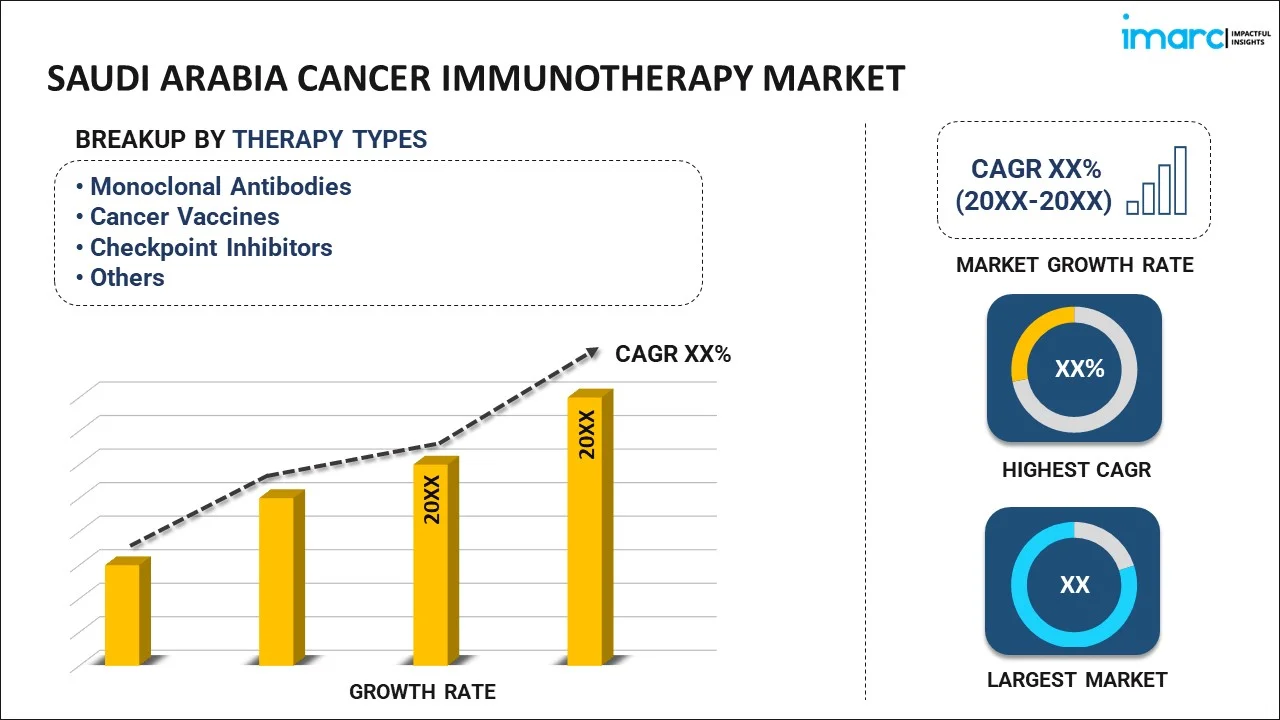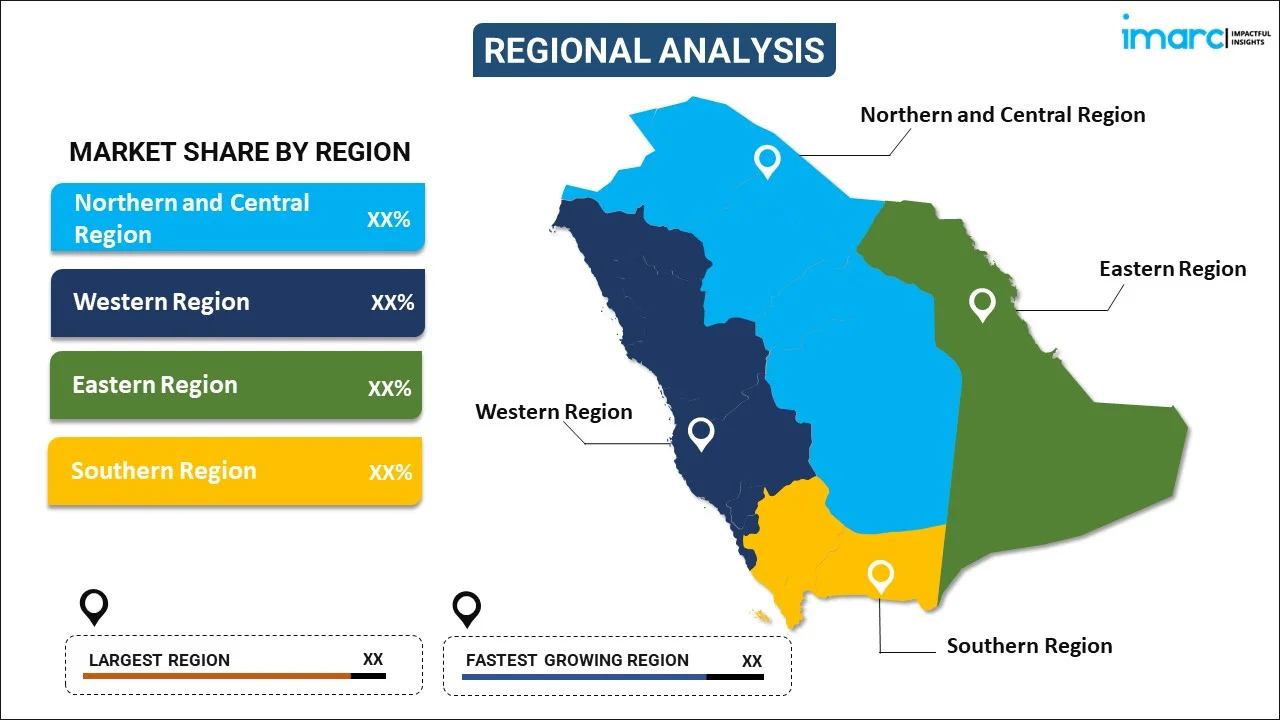
Saudi Arabia Cancer Immunotherapy Market Report by Therapy Type (Monoclonal Antibodies, Cancer Vaccines, Checkpoint Inhibitors, Immunomodulators, and Others), Application (Lung Cancer, Breast Cancer, Colorectal Cancer, Melanoma, Prostate Cancer, Head and Neck Cancer, and Others), End User (Hospitals, Cancer Research Centers, Clinics, and Others), and Region 2026-2034
Market Overview:
The Saudi Arabia cancer immunotherapy market size reached USD 1,303.4 Million in 2025. Looking forward, IMARC Group expects the market to reach USD 2,611.6 Million by 2034, exhibiting a growth rate (CAGR) of 8.03% during 2026-2034. The ongoing research and technological advancements, the increasing prevalence of cancer, the rising investments by pharmaceutical companies and governments in the research and development of immunotherapeutic drugs, and the shift toward personalized medicine are some of the factors propelling the market.
|
Report Attribute
|
Key Statistics
|
|---|---|
|
Base Year
|
2025 |
|
Forecast Years
|
2026-2034
|
|
Historical Years
|
2020-2025
|
| Market Size in 2025 | USD 1,303.4 Million |
| Market Forecast in 2034 | USD 2,611.6 Million |
| Market Growth Rate (2026-2034) | 8.03% |
Cancer immunotherapy represents a revolutionary approach to treating cancer by harnessing the body's immune system to recognize and eradicate malignant cells. Unlike traditional cancer treatments such as chemotherapy or radiation, which directly target cancer cells, immunotherapy works by stimulating the immune system to identify and attack cancer cells more effectively. At its core, the immune system is a complex network of cells, tissues, and organs designed to defend the body against harmful invaders, including abnormal cells like cancer. Cancer cells can sometimes evade detection by the immune system, allowing tumors to grow unchecked. Immunotherapy aims to overcome this evasion by enhancing the body's natural ability to recognize and eliminate cancer. There are various types of cancer immunotherapy, each with distinct mechanisms. Monoclonal antibodies, for instance, are laboratory-created molecules designed to target specific proteins on the surface of cancer cells, flagging them for destruction by the immune system. Adoptive cell transfer involves extracting, modifying, and reintroducing a patient's immune cells to enhance their cancer-fighting capabilities. Checkpoint inhibitors, another class of immunotherapy, block certain proteins that inhibit immune responses, unleashing the immune system to attack cancer more vigorously. Cancer vaccines, on the other hand, stimulate the immune system to recognize and remember cancer cells, providing a proactive defense against recurrence. The remarkable success of immunotherapy in certain cancers has transformed the landscape of cancer treatment, offering hope for durable responses and improved quality of life for patients. However, challenges remain, including the need for a better understanding of individual responses and potential side effects. The ongoing research and development in this field continue to refine and expand the applications of cancer immunotherapy, shaping the future of oncology.
Saudi Arabia Cancer Immunotherapy Market Trends:
The market in Saudi Arabia is majorly driven by the rapid technological advancements. This continuous exploration fuels the development of innovative drugs and treatment modalities, fostering a dynamic landscape within the market. Furthermore, the rising incidence of cancer is positively influencing the market. With cancer rates on the rise, there is an increasing demand for treatments that offer both efficacy and reduced side effects. Immunotherapy, with its promise of targeted and personalized treatment, addresses this need, positioning itself as a pivotal player in the evolving landscape of oncology. Besides, heavy investments in research and development (R&D) contribute significantly to the expansion of the cancer immunotherapy market. Pharmaceutical companies and governments alike are allocating substantial resources to advance the discovery and development of immunotherapeutic drugs. This influx of funding accelerates the translation of scientific insights into tangible clinical applications, driving the market forward. Positive outcomes from clinical trials also play a crucial role in propelling market growth. As evidence of the efficacy and safety of immunotherapeutic interventions accumulates, confidence in these treatments grows among healthcare professionals, regulators, and patients. The successful progression through clinical phases validates the potential of immunotherapy, encouraging further investment and adoption. A paradigm shift towards personalized medicine further fuels the market growth. The realization that each patient's immune response is unique has led to the development of immunotherapies tailored to individual characteristics. This personalized approach enhances treatment outcomes and minimizes adverse effects, aligning with the broader trend in healthcare towards precision medicine. This, in turn, is providing a boost to the market.
Saudi Arabia Cancer Immunotherapy Market Segmentation:
IMARC Group provides an analysis of the key trends in each segment of the market, along with forecasts at the country level for 2026-2034. Our report has categorized the market based on therapy type, application, and end user.
Therapy Type Insights:

- Monoclonal Antibodies
- Cancer Vaccines
- Checkpoint Inhibitors
- Immunomodulators
- Others
The report has provided a detailed breakup and analysis of the market based on the therapy type. This includes monoclonal antibodies, cancer vaccines, checkpoint inhibitors, immunomodulators, and others.
Application Insights:
- Lung Cancer
- Breast Cancer
- Colorectal Cancer
- Melanoma
- Prostate Cancer
- Head and Neck Cancer
- Others
A detailed breakup and analysis of the market based on the application have also been provided in the report. This includes lung cancer, breast cancer, colorectal cancer, melanoma, prostate cancer, head and neck cancer, and others.
End User Insights:
- Hospitals
- Cancer Research Centers
- Clinics
- Others
The report has provided a detailed breakup and analysis of the market based on the end user. This includes hospitals, cancer research centers, clinics, and others.
Regional Insights:

- Northern and Central Region
- Western Region
- Eastern Region
- Southern Region
The report has also provided a comprehensive analysis of all the major regional markets, which include Northern and Central Region, Western Region, Eastern Region, and Southern Region.
Competitive Landscape:
The market research report has also provided a comprehensive analysis of the competitive landscape in the market. Competitive analysis such as market structure, key player positioning, top winning strategies, competitive dashboard, and company evaluation quadrant has been covered in the report. Also, detailed profiles of all major companies have been provided.
Saudi Arabia Cancer Immunotherapy Market Report Coverage:
| Report Features | Details |
|---|---|
| Base Year of the Analysis | 2025 |
| Historical Period | 2020-2025 |
| Forecast Period | 2026-2034 |
| Units | Million USD |
| Scope of the Report | Exploration of Historical Trends and Market Outlook, Industry Catalysts and Challenges, Segment-Wise Historical and Future Market Assessment:
|
| Therapy Types Covered | Monoclonal Antibodies, Cancer Vaccines, Checkpoint Inhibitors, Immunomodulators, Others |
| Applications Covered | Lung Cancer, Breast Cancer, Colorectal Cancer, Melanoma, Prostate Cancer, Head and Neck Cancer, Others |
| End Users Covered | Hospitals, Cancer Research Centers, Clinics, Others |
| Regions Covered | Northern and Central Region, Western Region, Eastern Region, Southern Region |
| Customization Scope | 10% Free Customization |
| Post-Sale Analyst Support | 10-12 Weeks |
| Delivery Format | PDF and Excel through Email (We can also provide the editable version of the report in PPT/Word format on special request) |
Key Questions Answered in This Report:
- How has the Saudi Arabia cancer immunotherapy market performed so far and how will it perform in the coming years?
- What has been the impact of COVID-19 on the Saudi Arabia cancer immunotherapy market?
- What is the breakup of the Saudi Arabia cancer immunotherapy market on the basis of therapy type?
- What is the breakup of the Saudi Arabia cancer immunotherapy market on the basis of application?
- What is the breakup of the Saudi Arabia cancer immunotherapy market on the basis of end user?
- What are the various stages in the value chain of the Saudi Arabia cancer immunotherapy market?
- What are the key driving factors and challenges in the Saudi Arabia cancer immunotherapy?
- What is the structure of the Saudi Arabia cancer immunotherapy market and who are the key players?
- What is the degree of competition in the Saudi Arabia cancer immunotherapy market?
Key Benefits for Stakeholders:
- IMARC’s industry report offers a comprehensive quantitative analysis of various market segments, historical and current market trends, market forecasts, and dynamics of the Saudi Arabia cancer immunotherapy market from 2020-2034.
- The research report provides the latest information on the market drivers, challenges, and opportunities in the Saudi Arabia cancer immunotherapy market.
- Porter's five forces analysis assist stakeholders in assessing the impact of new entrants, competitive rivalry, supplier power, buyer power, and the threat of substitution. It helps stakeholders to analyze the level of competition within the Saudi Arabia cancer immunotherapy industry and its attractiveness.
- Competitive landscape allows stakeholders to understand their competitive environment and provides an insight into the current positions of key players in the market.
Need more help?
- Speak to our experienced analysts for insights on the current market scenarios.
- Include additional segments and countries to customize the report as per your requirement.
- Gain an unparalleled competitive advantage in your domain by understanding how to utilize the report and positively impacting your operations and revenue.
- For further assistance, please connect with our analysts.
 Request Customization
Request Customization
 Speak to an Analyst
Speak to an Analyst
 Request Brochure
Request Brochure
 Inquire Before Buying
Inquire Before Buying




.webp)




.webp)












